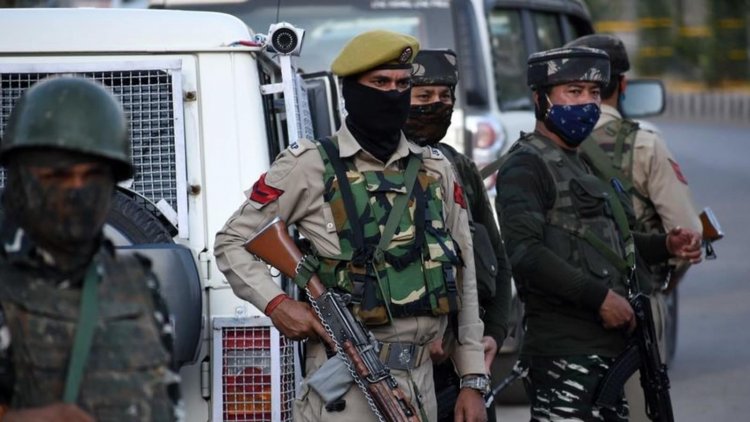Jammu and Kashmir: Taliban could have Serious Consequences
STORIES, ANALYSES, EXPERT VIEWS

Home Minister Amit Shah Thursday reviewed the security situation in Jammu and Kashmir with top officials of the security establishment in view of the Taliban’s takeover of Afghanistan.
Details are not available but those in the meeting included NSA Ajit Doval, Army Chief MM Naravane, R&AW chief Samant Goel, IB chief Arvind Kumar, J&K LG Manoj Sinha, BSF (Border Security Force) DG Pankaj Kumar Singh and CRPF (Central Reserve Police Force) DG Kuldeep Singh. This indicates it was a high level security meet.
Serious threat: expert view
India is concerned that only hours after the last of the US troops left Afghanistan, al-Qaeda hailed the Taliban and calling for the “liberation” of Kashmir, Somalia, Yemen, and other “Islamic lands.”
Analysts warn that increasing disaffection among young Kashmiris in the region could have serious consequences.
According to official figures, Kashmir is seeing a surge in foreign militants. There are now between 40 and 50 foreign militants, and 11 local militants active in north Kashmir bordering Pakistan, a report by The Hindu stated. This would be the first time in a decade that there are more foreign militants than local ones in the region.
Fearing a new wave of violence, analysts are watching the new geopolitical developments closely to determine how they would impact militancy in the region. “The Taliban takeover will not only impact Kashmir but the whole of South Asia will also be affected,” Shesh Paul Vaid, the former director-general of Jammu and Kashmir Police, told Deutsche Welle (DW). “The Taliban takeover will have a psychological impact on all terrorist groups operating all across the world, including in the Kashmir Valley. There is no denying of the fact that their morale has been boosted,” he said.
Vaid argued that organisations like Lashkar-e-Taiba (LeT) have helped the Taliban in taking control of Afghanistan. But he said it remains to be seen whether the Taliban will help them in return.
“The first thing the Taliban did after taking over was that they released all terrorists from prisons including those from the ‘Islamic State’ (IS), LeT and Jaish-e-Mohammed (JeM) … Pakistan's ISI could use its influence on the Taliban and shift its training camps in Pakistan-administered Kashmir to areas in Afghanistan,” he said, referring to Pakistan's intelligence service.
Victoria Schofield, an author and historian, assesses the situation differently. The Taliban takeover is “essentially an Afghan movement and the Kashmiri situation has a momentum of its own which is different,” Schofield, who has researched the Kashmir conflict over the last 35 years, told DW. “In the old days, you heard about Afghans going to fight and help their Muslim brothers in Kashmir but I don't see that happening now… it's not part of the Kashmiri psyche to get muddled up in the universal jihad,” she added.
Hurriyat finds parallels between Afghanistan and Kashmir
In their first reaction, the separatist Hurriyat Conference conglomerate led by Mirwaiz Umar Farooq, Thursday hoped that the rise to power of the Taliban in Afghanistan would put an end to the four decades of conflict and uncertainty in the country.
The Hurriyat also hoped that the new Taliban government would be “inclusive” and “broad-based” and would advocate equality. It should “bear in mind that Islam as a religion is unambiguous in advocating human equality and rights, economic fairness and religious tolerance as foundational values”, the statement said. “It hopes that these values will be the guiding principles of the new dispensation both in letter and spirit , as well as keeping up with internationally accepted norms.”
Significantly, the Hurriyat drew parallels between Kashmir and Afghanistan. “(Hurriyat) understands that no two conflict regions are the same and the differences between Afghanistan and Kashmir are well-known. However, we in Kashmir can surely empathise with the common people of the country who also have been living in a state of acute uncertainty for forty years,” the statement said. “Long term uncertainty takes its toll and we hope that people of Afghanistan will come out of it soon. We also hope that as the country begins the process of building its own future and realizing its aspirations, all regional and international member countries will extend their support to it.”
Former Chief Minister and PDP president Mehboob Mufti also hoped that the Taliban would rule Afghanistan according to “the true Shariah” and not by their own interpretation of Islamic jurisprudence.
A bruised Kashmir a strategic risk
Meanwhile, the situation in Kashmir can be interpreted according to which side of the fence one is sitting. Analyst Sankarshan Thakur spent a week in Kashmir last month, and was disappointed by what he saw. The preponderant majority of Kashmiris that he spoke to — politicians, bureaucrats, businessmen, doctors, journalists, friends — either said it was futile talking or requested anonymity……” A former minister said Kashmiris at least expected an apology following August 2019.
The pictures depict “Kashmir is normal, Kashmir has been fully integrated…..nobody wants darkness in their albums……But if cameras snap, they shut out too. Each frame means two images, what’s captured, what’s left out….”
In the circumstance, Raghu Raman (founding CEO of the National Intelligence Grid) says “a Talibanised Afghanistan is a major strategic threat.” There are now “tens of thousands of victorious, battle-hardened fighters looking for the next land to liberate from non-believers. And given that Pakistan is Taliban’s compass and China is belligerent towards India, it is obvious which valley the Taliban fighters will target next…..
“Our immediate strategy must however be to buttress Jammu and Kashmir, against ideological and military influx from Pakistan and Afghanistan. Previous insurgency attempts by Pakistan were thwarted repeatedly because Kashmiris refused to aid them. A bruised and alienated Kashmir and a divisive India are our biggest strategic risks…..”
















